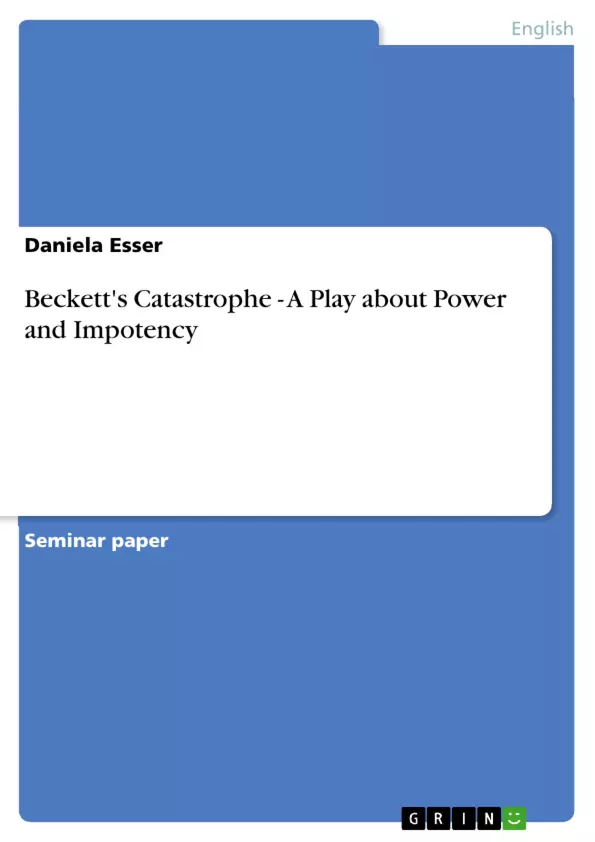Early in 1982, Samuel Beckett was one of the first writers to respond to an invitation from the Association Internationale de Défense des Artistes (AIDA) for contributions of works to show support for Václav Havel, the Czech playwright who was serving a prison sentence for his dissident activities. In 1979 Havel had been sentenced by the Czechoslovak communist regime to four and a half years imprisonment for subversion. He was co-founder and spokesman of the Charter 77 initiative as well as a member of the Czech Committee for the Defence of the Unjustly Persecuted (VONS). Shocked to hear that Havel had been forbidden to write, which must have "seemed the ultimate oppression"2, Beckett wrote Catastrophe3 and dedicated the play to Havel. It was first performed as part of `Une nuit pour Václav Havel′ at the Avignon Theatre Festival in July 1982.4
Knowlson, referring to Beckett′s refusal to employ didactic impulses in his writing, mentions that Beckett sometimes regretted his incapability "to write anything that dealt overtly with politics"5, but the biographer also asserts that Beckett utterly rejected political implications in his writing.6 However, with the invitation of AIDA, he could show his solidarity with a "victimized, imprisoned fellow writer"7 who took a courageous stand against abuses of human rights.
Nonetheless, a political reading of Catastrophe is grounded on the victimization of the Protagonist by the dictatorial Director. The play has also been identified as a "parable of Man and Satan" (see 2.2). In his biography Damned to Fame. The Life of Samuel Beckett, Knowlson argues that the play has also been related to Beckett′s "own horror of self-exposure, and linked to the essentially exhibitionistic nature of theatre."8
[...]
_______
1 Sartre, Jean-Paul: Geschlossene Gesellschaft. (Orig. Huis clos). Trans. Traugott König. Hamburg: Rowohlt, 1991, p. 59.
2 Knowlson, James: Damned to Fame. The Life of Samuel Beckett. London: Bloomsbury, 1996, p. 678.
3 Beckett, Samuel: Catastrophe. In: Collected shorter plays, London: Faber and Faber, 1984, pp. . 295-301. Hereafter cited as Catastrophe.
4 See Knowlson, James: Damned to Fame. The Life of Samuel Beckett. London: Bloomsbury, 1996, p. 677.
5 Ibid., p. 678.
6 Cf. ibid., p. 678.
7 Ibid., p. 678.
8 Ibid., p. 679.
Inhaltsverzeichnis (Table of Contents)
- Introduction
- Beckett's Catastrophe - a play about power and impotency
- A close reading of Catastrophe
- Catastrophe as a “parable of Man and Satan”
- The political dimension of Catastrophe
- Beckett's “Theatre of Power” and the Foucauldian “Gaze of Surveillance”
- Conclusion
Zielsetzung und Themenschwerpunkte (Objectives and Key Themes)
This paper analyzes Samuel Beckett's short play Catastrophe, written in 1982 and dedicated to Vaclav Havel. It explores the play's themes of power, impotency, and the victimization of the individual by an authoritarian regime. It also examines the play's relationship to Beckett's own artistic practice and the philosophical ideas of Michel Foucault.
- The interplay of power and impotency in the relationship between the Director and the Protagonist.
- The theatrical staging of power dynamics and the manipulation of the individual.
- The concept of “catastrophe” in its literal and metaphorical senses, as the climax of a dramatic action and as a symbol of individual downfall.
- The role of the audience as a voyeuristic spectator in the play's scenario.
- The relationship between Beckett's work and the philosophical ideas of Michel Foucault, particularly regarding the construction of the self and the mechanisms of power.
Zusammenfassung der Kapitel (Chapter Summaries)
- Introduction: This chapter provides background information on the play's genesis, its dedication to Václav Havel, and its connection to the political context of the time. It also discusses the play's themes and its relationship to Beckett's artistic philosophy.
- Beckett's Catastrophe – a play about power and impotency: This section delves deeper into the play's themes. It begins with a close reading of the play, focusing on the interactions between the Director, the Assistant, and the Protagonist. It examines the play's structure, its use of language, and its exploration of power dynamics.
Schlüsselwörter (Keywords)
The key themes and concepts explored in this work include power, impotency, victimization, surveillance, theatre of power, catastrophe, and the philosophical ideas of Michel Foucault. The analysis focuses on the play's portrayal of power dynamics in a theatrical setting and the implications of these dynamics for the individual.
- Citation du texte
- Daniela Esser (Auteur), 2001, Beckett's Catastrophe - A Play about Power and Impotency, Munich, GRIN Verlag, https://www.grin.com/document/6567



